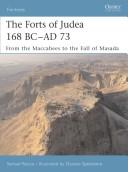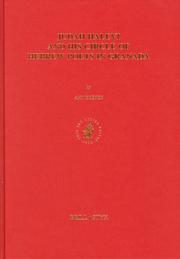| Listing 1 - 10 of 442 | << page >> |
Sort by
|
Book
ISBN: 9782915387155 291538715X Year: 2021 Publisher: Bagnolet : Lis & parle éditions,
Abstract | Keywords | Export | Availability | Bookmark
 Loading...
Loading...Choose an application
- Reference Manager
- EndNote
- RefWorks (Direct export to RefWorks)
Book
ISBN: 9004686762 Year: 2023 Publisher: Boston : BRILL,
Abstract | Keywords | Export | Availability | Bookmark
 Loading...
Loading...Choose an application
- Reference Manager
- EndNote
- RefWorks (Direct export to RefWorks)
"All can agree that the achievement of Moses Maimonides (d. 1204) set the standard for subsequent works of "Jewish philosophy". But just what were the contours of philosophical-scientific inquiry that Maimonides replaced? A fairly large array of diverse texts have been studied, but no comprehensive picture has yet emerged. The newly discovered Hebrew dialogue published here has points of contact of various depth with most of the major works of pre-Maimonidean thought. It shares as well influences from without, especially from the Islamic kalam. The dialogue thus presents, in an engaging literary form, a clear and detailed snapshot of pre-Maimonidean philosophy and science"--
Jewish philosophy --- Wills, Ethical --- Tibon, Yehudah ibn, --- Influence.
Book
ISBN: 1282472844 9786612472848 1584658126 9781584658122 1584657332 1684580005 Year: 2009 Publisher: Hanover Brandeis University Press
Abstract | Keywords | Export | Availability | Bookmark
 Loading...
Loading...Choose an application
- Reference Manager
- EndNote
- RefWorks (Direct export to RefWorks)
An astonishing revision of the prevailing critical analysis of the poetry of Yehuda Amichai, based on newly discovered materials
Poets, Israeli --- Israeli poets --- Amichai, Yehuda --- Amichai, Yehuda. --- Amihai, Yehuda --- ʻAmiḥai, Yehudah --- Foifer, Yehudah --- Amikhaĭ, Ieguda --- Amichay, Yehuda --- Amichay, Jehuda --- Amijai, Yehuda --- Amijai, Iehuda --- Pfeuffer, Ludwig --- Pfeuffer, Yehudah --- עמיחי, יהודה --- עמיחי, יהודה־־ביקורת ופרוש --- Criticism and interpretation.
Dissertation
ISBN: 9090020667 Year: 1988 Publisher: Groningen : [s.n.],
Abstract | Keywords | Export | Availability | Bookmark
 Loading...
Loading...Choose an application
- Reference Manager
- EndNote
- RefWorks (Direct export to RefWorks)
Piyutim. --- Cairo Genizah. --- Yehudah, --- Hymnes hébraïques --- Manuscrits de la génizah du caire --- Piyyutim
Book
ISBN: 9780253026019 0253026016 9780253025968 0253025966 Year: 2017 Publisher: Bloomington and Indianapolis, Indiana
Abstract | Keywords | Export | Availability | Bookmark
 Loading...
Loading...Choose an application
- Reference Manager
- EndNote
- RefWorks (Direct export to RefWorks)
"Beginning in 1172, Judah ibn Tibbon, who was called the father of Hebrew translators, wrote a letter to his son that was full of personal and professional guidance. The detailed letter, described as an ethical will, was revised through the years and offered a vivid picture of intellectual life among Andalusi elites exiled in the south of France after 1148. S. J. Pearce sets this letter into broader context and reads it as a document of literary practice and intellectual values. She reveals how ibn Tibbon, as a translator of philosophical and religious texts, explains how his son should make his way in the family business and how to operate, textually, within Arabic literary models even when writing for a non-Arabic audience. While the letter is also full of personal criticism and admonitions, Pearce shows Ibn Tibbon making a powerful argument in favor of the continuation of Arabic as a prestige language for Andalusi Jewish readers and writers, even in exile outside of the Islamic world"--
Wills, Ethical. --- Hebrew literature, Medieval --- Ethical wills --- Jewish ethics --- Arabic influences. --- Tibon, Yehudah ibn,
Book
Year: 1968 Publisher: Leiden : Brill,
Abstract | Keywords | Export | Availability | Bookmark
 Loading...
Loading...Choose an application
- Reference Manager
- EndNote
- RefWorks (Direct export to RefWorks)

ISBN: 9781846031717 1846031710 Year: 2008 Volume: 65 Publisher: Oxford Osprey
Abstract | Keywords | Export | Availability | Bookmark
 Loading...
Loading...Choose an application
- Reference Manager
- EndNote
- RefWorks (Direct export to RefWorks)
Fortification --- Judea (Region) --- Antiquities --- Fortification, Primitive --- Forts --- Military engineering --- Siege warfare --- Erets Yehudah (Region) --- Ereẓ Yehudah (Region) --- Judah, Land of (Region) --- Land of Judah (Region) --- Yahūdhā (Region) --- Yehuda (Region) --- Antiquities. --- Fortification - Judaea (Region) --- Judea (Region) - Antiquities
Book
ISBN: 0804797218 9780804797214 9780804782951 0804782954 Year: 2016 Publisher: Stanford, California
Abstract | Keywords | Export | Availability | Bookmark
 Loading...
Loading...Choose an application
- Reference Manager
- EndNote
- RefWorks (Direct export to RefWorks)
'The Full Severity of Compassion' is both a modular retrospective of Yehuda Amichai's poetric project and a reassessment - by attending closely to the theory embedded in the poetry - of major issues in contemporary literary studies, from the politics of form to radical allusion, and from metaphor to translation.
Israeli poetry --- Jewish poetry --- Jewish literature --- Hebrew poetry, Modern --- Israeli poetry (Hebrew) --- Israeli literature --- History and criticism. --- Amichai, Yehuda --- Amihai, Yehuda --- ʻAmiḥai, Yehudah --- Foifer, Yehudah --- Amikhaĭ, Ieguda --- Amichay, Yehuda --- Amichay, Jehuda --- Amijai, Yehuda --- Amijai, Iehuda --- Pfeuffer, Ludwig --- Pfeuffer, Yehudah --- עמיחי, יהודה --- עמיחי, יהודה־־ביקורת ופרוש --- Criticism and interpretation.

ISBN: 9004147098 9789004147096 9781429427159 1429427159 9781433704123 1433704129 1280868686 9786610868681 9789047408376 Year: 2005 Publisher: Leiden ; Boston : Brill/Styx,
Abstract | Keywords | Export | Availability | Bookmark
 Loading...
Loading...Choose an application
- Reference Manager
- EndNote
- RefWorks (Direct export to RefWorks)
This study focuses on the earliest period of creativity in the life of Judah Halevi (1075-1141), the greatest Hebrew poet since biblical times, and offers a portrait of a unique circle of Hebrew poets centering on the Muslim city-kingdom of Granada.
Judah, --- Abū al-Ḥasan, --- Abul-Hassan, --- Galevi, --- Giuda Levita, --- Halevi, Jehuda, --- Halevi, Judah, --- Haleṿi, Yehudah, --- Halevy, Yehuda, --- Halewy, Yehudah, --- Hallevi, Juda, --- Hallevi, Judah, --- Ieguda, Galevi, --- Jehuda, --- Jehudah, Hallevi, --- Leṿi, Yehudah ha-, --- Levita, Giuda, --- Rihal, --- Yehudá, --- Yehuda Halevi, --- Yĕhudah Abū-l-Hasān ben Šĕmuʼel, --- Yehudah, ha-Leṿi, --- Yĕhūdāh, ha-Lēwī, --- Yehudah Halewy, --- Иегуда, --- ריה״ל --- הלוי, יהודה --- הלוי, יהודה, --- יהודה בן שאול, --- יהודה בן שמואל הלוי --- יהודה בן שמואל, --- יהודה, --- יהודה הלוי --- יהודה, הלוי --- יהודה הלוי, --- יהודה --- יהודה, הלוי, --- יהודיה, --- Criticism and interpretation. --- Languages & Literatures --- Middle Eastern Languages & Literatures
Book
ISBN: 9782226400758 2226400753 Year: 2018 Publisher: Paris Albin Michel
Abstract | Keywords | Export | Availability | Bookmark
 Loading...
Loading...Choose an application
- Reference Manager
- EndNote
- RefWorks (Direct export to RefWorks)
Parmi les figures célèbres de l’Evangile, Judas continue d’incarner le mal, la traitrise et la cupidité. Mais sur quels versets se fonde une telle vision du personnage, et pourquoi cette lecture ? Anne Soupa reprend point par point ce dossier instruit à charge par la tradition chrétienne, et manipulé pour alimenter vingt siècles de haine anti-juive. Si Judas a bien fait entrer Jésus dans le temps du malheur, il a aussi son « côté soleil ». Lui, l’un des Douze apôtres, il a suivi son Maître depuis le début de sa vie publique, il l’a aimé, il a participé à son dernier repas et a eu les pieds lavés par lui. Selon les évangélistes, il l’a « livré » et non « trahi ». Alors pourquoi cette diabolisation ? Ne vise-t-elle pas à faire de lui le bouc émissaire qui libère les disciples de la culpabilité d’avoir abandonné Jésus ? En somme, Judas était le coupable idéal…
Judas Iscariot. --- Judas Iscariote --- Yehudah ish-Ḳeriyot --- Giuda Iscariota --- Yahūdhā al-Iskhariyūṭī --- Judas Iskariot --- Iuda Iskariot --- Judasz Iskariota
| Listing 1 - 10 of 442 | << page >> |
Sort by
|

 Search
Search Feedback
Feedback About UniCat
About UniCat  Help
Help News
News